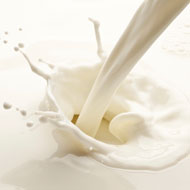
Farmers will be 'disappointed and concerned' by losses - NFU
Dairy company First Milk has announced losses of around £22 million in the last financial year (2014/15).
Recently appointed chief executive Mike Gallacher, said: "The 2014 losses we are announcing today reflect the market context, but also poor operational performance that impacted at the same time as the business paid out higher milk prices to our famers in 2014 than was received in commercial returns."
He added that a plan to stabilise the business has been discussed with First Milk's farmer members in recent weeks: "…member milk prices must be consistent with our commercial income," he said. "We will only pay out what we get in."
Volatility in the global dairy market has resulted in significant milk price cuts, creating a crisis for dairy farmers. Earlier this month it was revealed that the dairy market equivalent has sunk to 24.3ppl - it's lowest point in eight years.
Back in May, First Milk proposed to cut 70 staff and reduce milk prices by an average of 0.33 pence per litre (ppl), as part of a turnaround plan to stabilise the business.
Commenting on the losses recorded by First Milk, Rob Harrison, chairman of the dairy board at National Farmers Union, said British farmers and suppliers will be "very disappointed and concerned".
“This is another set of results highlighting how unsustainable the UK dairy industry is at the moment. It shows the urgent need for meaningful change to bring long term prosperity...
"If the UK is to have a sustainable dairy industry in the long run, the whole supply chain needs to look at how it adapts to better manage volatility and face up to our collective challenges."



 HMRC has invited feedback to its communications regarding the employment status of locum vets and vet nurses.
HMRC has invited feedback to its communications regarding the employment status of locum vets and vet nurses.